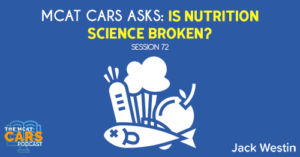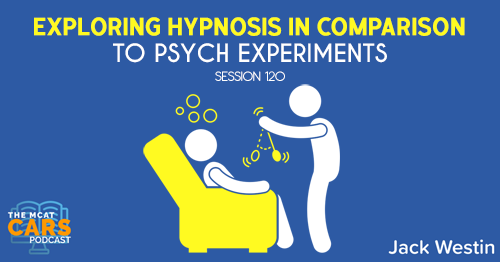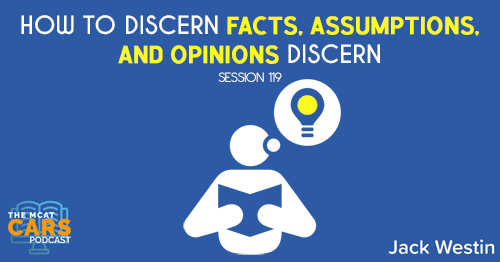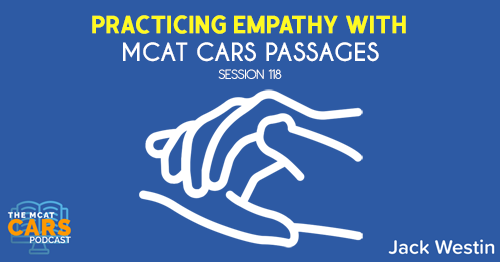Apple Podcasts | Google Podcasts

Session 72
When so much of what we are told about diet, health, and weight loss is inconsistent and contradictory, can we believe any of it? Follow along and find out.
If this is your first time, please check out all our other podcasts on the Meded Media. And if you’re looking for some more personalized help, check out the Jack Westin‘s amazing course with free trial sessions.
Listen to this podcast episode with the player above, or keep reading for the highlights and takeaway points.
Link to article:
https://undark.org/2019/07/18/science-of-eggs/
It’s been a tortuous path for the humble egg. For much of our history, it was a staple of the American breakfast — as in, bacon and eggs. Then, starting in the late 1970s and early 1980s, it began to be disparaged as a dangerous source of artery-clogging cholesterol, a probable culprit behind Americans’ exceptionally high rates of heart attack and stroke. Then, in the past few years, the chicken egg was redeemed and once again touted as an excellent source of protein, unique antioxidants like lutein and zeaxanthin, and many vitamins and minerals, including riboflavin and selenium, all in a fairly low-calorie package.
This March, a study published in JAMA put the egg back on the hot seat. It found that the amount of cholesterol in a bit less than two large eggs a day was associated with an increase in a person’s risk of cardiovascular disease and death by 17 percent and 18 percent, respectively. The risks grow with every additional half egg. It was a really large study, too — with nearly 30,000 participants — which suggests it should be fairly reliable.
So which is it? Is the egg good or bad? And, while we are on the subject, when so much of what we are told about diet, health, and weight loss is inconsistent and contradictory, can we believe any of it?
Quite frankly, probably not. Nutrition research tends to be unreliable because nearly all of it is based on observational studies, which are imprecise, have no controls, and don’t follow an experimental method. As nutrition-research critics Edward Archer and Carl Lavie have put it, “’Nutrition’ is now a degenerating research paradigm in which scientifically illiterate methods, meaningless data, and consensus-driven censorship dominate the empirical landscape.”
Other nutrition research critics, such as John Ioannidis of Stanford University, have been similarly scathing in their commentary. They point out that observational nutrition studies are essentially just surveys: Researchers ask a group of study participants — a cohort — what they eat and how often, then they track the cohort over time to see what, if any, health conditions the study participants develop.
The trouble with the approach is that no one really remembers what they ate. You might remember today’s breakfast in some detail. But, breakfast three days ago, in precise amounts? Even the unadventurous creature of habit would probably get it wrong. That tends to make these surveys inaccurate, especially when researchers try to drill down to specific foods.
[02:45] Paragraph 1, Sentence 1
It’s been a tortuous path for the humble egg.
Jack says:
The author is talking about an egg. You can probably imagine tortuous as something bad and difficult. The author has brought up the fact that it’s a humble egg. So it’s painting the picture that maybe the egg isn’t so bad. Someone who’s usually humble is a good connotation
[03:27] Paragraph 1, Sentence 2
For much of our history, it was a staple of the American breakfast — as in, bacon and eggs.
Jack says:
The author is saying how the egg is a staple breakfast.
[03:40] Paragraph 1, Sentence 3
Then, starting in the late 1970s and early 1980s, it began to be disparaged as a dangerous source of artery-clogging cholesterol, a probable culprit behind Americans’ exceptionally high rates of heart attack and stroke.
Jack says:
A little bit of history here as to what happened to the eggs in the 70s and the 80s and how it was the cause of our health issues.
[04:09] Paragraph 1, Sentence 4
Then, in the past few years, the chicken egg was redeemed and once again touted as an excellent source of protein, unique antioxidants like lutein and zeaxanthin, and many vitamins and minerals, including riboflavin and selenium, all in a fairly low-calorie package.
Jack says:
More recently, the egg is being touted as healthy for you. Initially, it was a staple. Then it went negative and now we’re going back to this positive route about the egg. It seems confusing as they’re going back and forth. And this is the point the author is trying to get at.
[05:10] Paragraph 2, Sentences 1-2
This March, a study published in JAMA put the egg back on the hot seat. It found that the amount of cholesterol in a bit less than two large eggs a day was associated with an increase in a person’s risk of cardiovascular disease and death by 17 percent and 18 percent, respectively.
Jack says:
“Hot seat” is a figure of speech. When you put someone or something on a hot seat, you’re saying you’re putting it back in the spotlight. You’re scrutinizing it, critiquing it in some ways. As you can see, it’s a negative critique.
[06:08] Paragraph 2, Sentence 3
The risks grow with every additional half egg.
Jack says:
The author is saying there is more risk when you’re eating more eggs.
[06:25] Paragraph 2, Sentence 4
It was a really large study, too — with nearly 30,000 participants — which suggests it should be fairly reliable.
Jack says:
The author is pointing out that it’s a big study with a lot of people. Hopefully, it’s real data and not something they’re going to take back in two days.
The author is saying it’s a really large study to suggest it should be fairly reliable. So it’s something important. We should then take this into account.
[07:35] Paragraph 3, Sentences 1-2
So which is it? Is the egg good or bad?
Jack says:
So the author is posing the question if the egg is good or bad.
[08:00] Paragraph 3, Sentence 3
And, while we are on the subject, when so much of what we are told about diet, health, and weight loss is inconsistent and contradictory, can we believe any of it?
Jack says:
That’s one of the biggest arguments the author is bringing is up. One day we’re told salt is bad and the next day it’s good. And one day sugar is bad and then next day, sugar is good. Eggs are bad and eggs are good.
The author is bringing in skepticism and that’s important. So be able to look at these kinds of things whether the author is confident, skeptical, or negative about something. This is the tone of the passage.
[08:45] Paragraph 4, Sentence 1
Quite frankly, probably not.
Jack says:
Now, we know the author’s point of view. It’s very direct to the point. This is what we’re looking for.
[09:05] Paragraph 4, Sentence 2
Nutrition research tends to be unreliable because nearly all of it is based on observational studies, which are imprecise, have no controls, and don’t follow an experimental method.
Jack says:
They’re educating us as you’re reading the sentence. We now know if the author likes observational studies or find them to be very good in terms of giving us data or conclusion.
Here’s a possible MCAT question: Imagine the author wanted to study how eating meat affects our health. which of the following would the author recommend?
Then don’t pick observational studies. In this case, it’s implied that the author does not like observational studies, at least not for diet research.
[10:10] Paragraph 4, Sentence 3
As nutrition-research critics Edward Archer and Carl Lavie have put it, “’Nutrition’ is now a degenerating research paradigm in which scientifically illiterate methods, meaningless data, and consensus-driven censorship dominate the empirical landscape.”
Jack says:
The author is mentioning this as a support that you shouldn’t listen to these data points.
[11:10] Paragraph 5, Sentence 1
Other nutrition research critics, such as John Ioannidis of Stanford University, have been similarly scathing in their commentary.
Jack says:
Another person here and the author associated it with a school.
[11:39] Paragraph 5, Sentence 2
They point out that observational nutrition studies are essentially just surveys: Researchers ask a group of study participants — a cohort — what they eat and how often, then they track the cohort over time to see what, if any, health conditions the study participants develop.
Jack says:
The author is giving us some background on what these observational studies are and why they aren’t very good. They’re simplifying it to surveys which isn’t a great thing.
[12:30] Paragraph 6, Sentence 1
The trouble with the approach is that no one really remembers what they ate.
Jack says:
It’s a straightforward sentence.
[12:52] Paragraph 6, Sentence 2
You might remember today’s breakfast in some detail.
Jack says:
Another straightforward sentence here.
[12:57] Paragraph 6, Sentence 3
But, breakfast three days ago, in precise amounts?
Jack says:
The author is saying that our memory isn’t very good in terms of precise amounts. And the research is asking how many eggs you’ve eaten. It’s not something that’s easy to remember.
[13:23] Paragraph 6, Sentence 4
Even the unadventurous creature of habit would probably get it wrong.
Jack says:
The author is trying to position that the observational study is not working out. Another that’s problematic with nutritional research or observational research is memory. It’s even suggesting that even people who eat the same thing everyday or don’t try to venture into other kinds of foods might not have the greatest memory either. It’s downplaying anyone’s memory.
[14:10] Paragraph 6, Sentence 5
That tends to make these surveys inaccurate, especially when researchers try to drill down to specific foods.
Jack says:
The research is flawed because it boils down to surveys, which are also flawed because people don’t remember what they ate. This is bad because it leads to inaccurate data. Nutritional research is not sufficient as long as it’s coming from this observational point of view.
[15:05] Final Thoughts
Even for the hardest MCAT passages, you’re going to find the author’s position in a very direct manner.
If it seems like an easy passage, it would keep you at ease when you’re reading every sentence so you’re able to catch it. But when we’re faced with a very convoluted, conceptually heavy vocabulary-dense passage, we tend to shut our minds to these more simple sentences that are everywhere.
The key is don’t give up. Keep reading, keep trying to understand. Even if the puzzle is difficult, you should be able to find something that you can use.
'You only need 20% understanding of the passage – but the right 20% to get almost every question right.'Click To TweetLinks:
Link to article:
SEARCH SITE
SEARCH SITE
LISTEN FOR FREE











